Dylann Roof Federal Hate Crime Charges In Charleston Shooting Could Be Imminent, New Court Document Shows

Dylann Roof, the 21-year-old suspected Charleston, South Carolina, church shooter, may face a federal judge and jury on hate crime charges. Two federal public defenders in South Carolina have been assigned to represent Roof, as the Federal Bureau of Investigation pursues charges against him, the Charleston Post and Courier reported.
The FBI and federal prosecutors had already confirmed that they’re conducting a hate crime investigation into the June 17 mass shooting that killed nine black people at Mother Emanuel African Methodist Episcopal Church, but an judge’s order Monday assigning Assistant U.S. Public Defenders Ann Walsh and Bill F. Nettles IV is an indication that hate crime charges could be imminent.
U.S. District Court Judge Bristow Marchant’s order, the first public document filed in connection with the federal case against Roof, also indicates federal prosecutors Nathan Williams and Julius Richardson will handle the case. Roof is already facing nine counts of murder and a weapons charge in the state's General Sessions Court. But local prosecutors can’t pursue hate crime charges because South Carolina doesn’t have a law on the books.
The public and elected officials generally agree that Roof, a white man who made numerous racist comments to his friends -- and reportedly told local police that he hoped to start a "race war" after the church massacre -- committed a hate crime. He would be prosecuted under the Matthew Shepard and James Byrd, Jr. Hate Crimes Prevention Act of 2009, which was enacted after the 1998 hate-fueled murders of Shepard, a gay college student targeted by homophobic men in Wyoming, and Byrd, a black man targeted by white supremacists in Texas.
The act provides federal funding and technical assistance to state and local officials in order to help them investigate and prosecute hate crimes. The act also created a federal criminal law that penalizes willfully causing bodily injury, when the crime is committed because of the actual or perceived race, color, religion, national origin, gender, sexual orientation, gender identity or disability of the victim, according to the statute.
© Copyright IBTimes 2024. All rights reserved.












